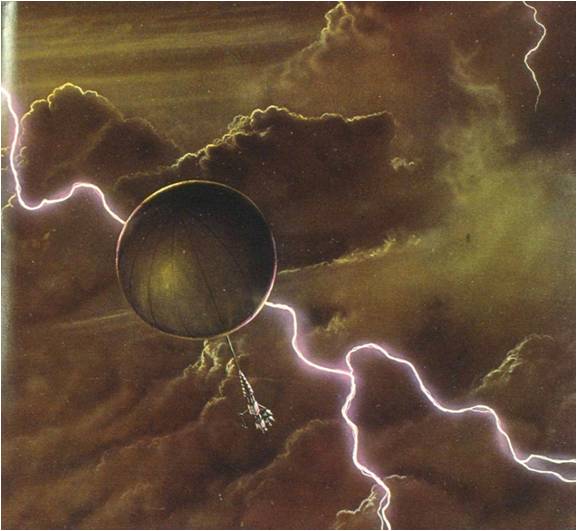9 December 2011
Spacecraft detects lightning on Venus
Posted by kramsayer

An artist’s conception of lighting striking an aerial robot in Venus’s atmosphere. (Credit: Christopher Russell)
The goddess Venus radiates beauty; the planet Venus radiates electromagnetic waves.
These waves were picked up the Venus Express, a European satellite orbiting Earth’s nearby twin, and provide evidence of lightning in its atmosphere.
Here on Earth, lightning creates waves of electromagnetic energy that travel out in arcs aligned with the planet’s magnetic field. The waves contain a symphony of different frequencies, and each component travels at a different speed as it whooshes around the globe – a phenomenon known as dispersion. Scientists call the waves whistlers because they sound like whistling on a radio set.
As far back as the late 1800s, Franco-Prussian war spies heard these whistlers on their ham radios, but had no idea what the signals were. Scientists figured out later that lightning was the cause.
Planetary scientists from the University of California, Los Angeles (UCLA) have now detected whistlers around Venus. Jillian Daniels, a graduate student at UCLA who works with geophysicist Christopher Russell, presented a poster on the work Wednesday morning at the American Geophysical Union’s Fall Meeting.
Unlike Earth, Venus doesn’t have an internally-generated magnetic field. On Earth, water in the planet’s core churns molten iron which produces its field. Venus has no water in its core; instead, the planet’s solar wind induces its magnetic field.
“If you had a ball on a stick with the wind blowing and you put a handkerchief over it, that’s kind of what the field looks like,” Daniels said.
The Venus Express measured electromagnetic bursts from Venus, though only a few had the characteristic “whistling” sounds. It was enough to suggest that lightning does crackle over Venus, probably caused by electric charge differences in the planet’s sulfuric acid clouds, the scientists say. The finding adds more fuel to a longstanding debate over the existence of Venus’ lightning.
Some skeptics point to the fact that the Cassini-Huygens space probe failed to detect lightning while flying past the planet in 1998 and 1999. Daniels doesn’t buy this criticism because the flyby was so brief. “One negative data point is not enough to disprove something,” she said.
Others cite the lack of definitive visual proof: “I’m not convinced the radiofrequency signals from Venus are produced by lightning,” said Hugh Christian, a physicist at the University of Alabama in Huntsville who attended the poster session, adding that he’d want to see more evidence from optical signals.
The whistlers have Daniels convinced, though. “It’s yet another confirmation that what we’re seeing is lightening,” she said.
-Tanya Lewis is a science communication graduate student at UC Santa Cruz.


 GeoSpace is a blog on Earth and space science, managed by AGU’s Public Information staff. The blog features posts by AGU writers and guest contributors on all sorts of relevant science topics, but with a focus on new research and geo and space sciences-related stories that are currently in the news.
GeoSpace is a blog on Earth and space science, managed by AGU’s Public Information staff. The blog features posts by AGU writers and guest contributors on all sorts of relevant science topics, but with a focus on new research and geo and space sciences-related stories that are currently in the news.